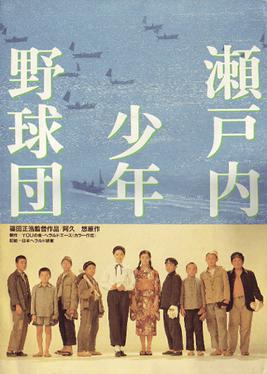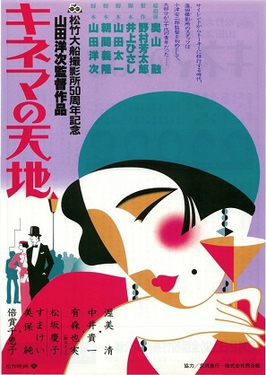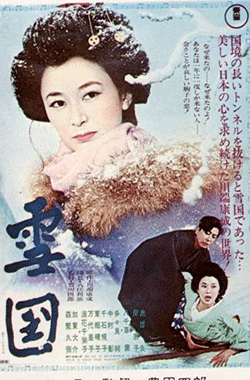Related Research Articles

Nihonmatsu is a city in Fukushima Prefecture, Japan. As of 1 April 2020, the city has an estimated population of 54,013 in 20,179 households, and a population density of 160 persons per km2. The total area of the city was 344.42 square kilometres (132.98 sq mi). The Adachi neighborhood of Nihonmatsu was the birthplace of artist Chieko Takamura, subject of the book of poems Chieko's Sky, written by her husband Kōtarō Takamura.
Shima Iwashita is a Japanese stage and film actress who has appeared in films of Yasujirō Ozu, Keisuke Kinoshita, Masaki Kobayashi and most frequently of Masahiro Shinoda, her husband.

MacArthur's Children is a 1984 Japanese film. Describing the impact of the United States' occupation of Japan from the perspective of the inhabitants of a small, rural island community, the film featured the big screen debut of actor Ken Watanabe.

Kōtarō Takamura was a Japanese poet and sculptor.

Chieko Takamura was a Japanese artist.
Takamura is a Japanese surname. Notable people with the surname include:

Twin Sisters of Kyoto is a 1963 Japanese drama film directed by Noboru Nakamura, based on the novel The Old Capital (1962) by Nobel Prize laureate Yasunari Kawabata. The film was Japan's submission for the 1964 Academy Award for Best Foreign Language Film.

The Scandalous Adventures of Buraikan is a 1970 Japanese film directed by Masahiro Shinoda. It was Japan's submission to the 43rd Academy Awards for the Academy Award for Best Foreign Language Film, but was not accepted as a nominee. Screen play by Shuji Terayama.

Final Take is a 1986 Japanese drama film directed by Yoji Yamada. It was Japan's submission to the 59th Academy Awards for the Academy Award for Best Foreign Language Film, but was not accepted as a nominee.

Snow Country is a 1957 Japanese drama film directed by Shirō Toyoda, based on the novel of the same name by Yasunari Kawabata. The film was entered into the 1958 Cannes Film Festival.

It's Tough Being a Man is a 1969 Japanese comedy film directed by Yoji Yamada and starring Kiyoshi Atsumi. It is the first entry in the popular, long-running Otoko wa Tsurai yo series.

Tora-san's Rise and FallakaTora-san Finds a Sweetheart, Tora-san Meets the Songstress Again and Torasan: Love Under the Umbrella is a 1975 Japanese comedy film directed by Yoji Yamada. It stars Kiyoshi Atsumi as Torajirō Kuruma (Tora-san), and Ruriko Asaoka as his love interest or "Madonna". Tora-san's Rise and Fall is the fifteenth entry in the popular, long-running Otoko wa Tsurai yo series.

Tora-san, the Matchmakera.k.a.Tora-san Riding High is a 1979 Japanese comedy film directed by Yoji Yamada. It stars Kiyoshi Atsumi as Torajirō Kuruma (Tora-san), and Kaori Momoi as his love interest or "Madonna". Tora-san, the Matchmaker is the twenty-third entry in the popular, long-running Otoko wa Tsurai yo series.

Tora-san, the Go-Between is a 1985 Japanese comedy film directed by Yoji Yamada. It stars Kiyoshi Atsumi as Torajirō Kuruma (Tora-san), and Kanako Higuchi as his love interest or "Madonna". Tora-san, the Go-Between is the thirty-fifth entry in the popular, long-running Otoko wa Tsurai yo series.
Lost Spring is a 1967 Japanese drama film directed by Noboru Nakamura. It is based on a radio play by Yumie Hiraiwa, who co-wrote the screenplay with Nakamura.

Gonza the Spearman is a 1986 Japanese drama film directed by Masahiro Shinoda. It was entered into the 36th Berlin International Film Festival, where it won the Silver Bear for outstanding artistic contribution.
Chieko is a feminine Japanese given name. Notable people with the name include:
Captive's Island is a 1966 Japanese drama film directed by Masahiro Shinoda. The screenplay by Shintarō Ishihara was based on the novel Ryujinjima ni nite by Taijun Takeda.
Fireflies in the North is a 1984 Japanese film directed by Hideo Gosha. The lead star is Tatsuya Nakadai.
Abare Kishidō is a 1965 Japanese action film directed by Isamu Kosugi. It stars Joe Shishido and Tetsuya Watari. Tetsuya Watari made his acting debut in the film, playing the role of Joe's younger brother.
References
- 1 2 "智恵子抄 1967". Kinema Junpo (in Japanese). Retrieved 17 August 2021.
- 1 2 "智恵子抄". Japanese Movie Database (in Japanese). Retrieved 17 August 2021.
- ↑ "智恵子抄" (in Japanese). kotobank. Retrieved 27 December 2020.
- ↑ "The 40th Academy Awards (1968) Nominees and Winners". oscars.org. Retrieved 12 November 2011.
- ↑ Variety's Film Reviews 1968-1970. Vol. 12. R. R. Bowker. 1983. There are no page numbers in this book. This entry is found under the header "March 20, 1968". ISBN 0-8352-2792-8.
- ↑ "智恵子抄 1957". Kinema Junpo (in Japanese). Retrieved 17 August 2021.
- ↑ "智恵子抄". Japanese Movie Database (in Japanese). Retrieved 17 August 2021.